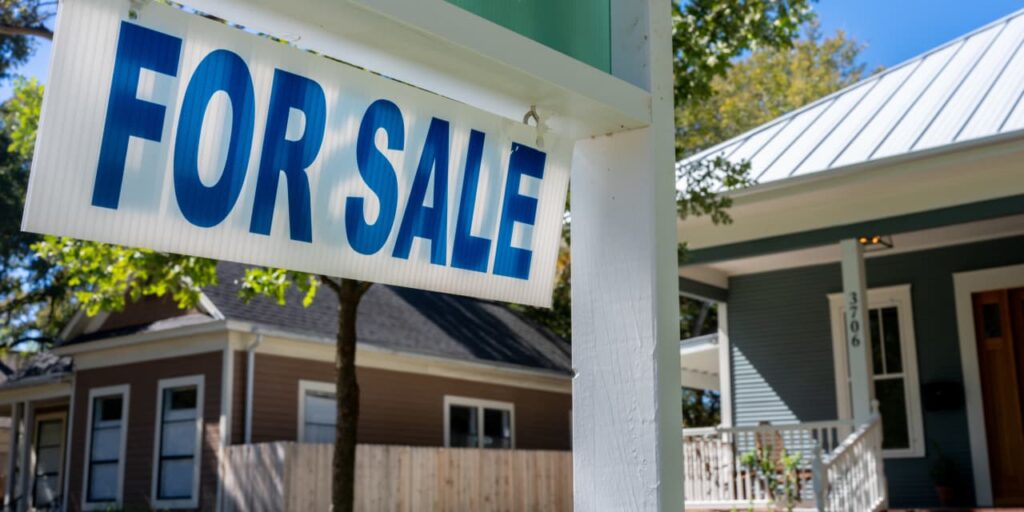Home prices will fall in 2024 for the first time in more than a decade, according to one industry forecaster—but declines won’t be uniform.
Sales will remain low; the supply of available homes for sale will continue to slide; and mortgage rates will average 6.8% in the new year, according to Realtor.com’s forecast published on Wednesday. (Barron’s parent company,
News Corp,
also owns Move, which runs the real estate listings sites Realtor.com and Move.com).
The median home sale price will fall 1.7% next year after eking out an anticipated 0.2% gain in 2023, according to the forecast. If that comes to pass, it would be the first full-year drop since 2011, when prices bottomed in the wake of the housing-led 2008-09 financial crisis. Once buyers expect mortgage rates to ease, they may hold out for even lower rates, cutting into demand, Realtor.com says.
Realtor.com joins a small but growing group of industry prognosticators calling for price declines next year—though the outlooks run the spectrum from a mild dip to an extended slump.
Zillow
on Monday said home values would fall 0.2% between this month through October 2024, while the National Association of Realtors in its October forecast called for a slight quarter-over-quarter drop in median sale prices in 2024’s second quarter.
Moody’s
Analytics told Barron’s earlier this month that it expects prices measured by its index will begin to fall in August 2024, a decline set to last through the end of 2025. Barron’s recently detailed some of the catalysts that could bring about a drop in demand and an increase in supply in 2024, leading to lower prices.
Of course, prices won’t slump in every market—and in many places they are estimated to rise. Of the 100 large metro areas included in the report, 63 are likely to see prices rise in 2024. Inventory constraints in some of those 100 markets will drive sales lower, and in turn “that lack of activity helps keep prices from adjusting lower,” Danielle Hale, Realtor.com’s chief economist, told Barron’s.
Of those areas, prices are projected to rise most in Des Moines, Iowa; Rochester, N.Y., and Detroit—between 10% and 11%, according to the forecast. Markets in the Midwest and Northeast dominated the website’s latest ranking of the nation’s hottest housing markets as house hunters seek out relatively affordable options.
“These areas have home sales prices that are on average one-third lower than U.S. home prices in 2023,” Hale said. Even after 2024’s outsized gains, home prices in these metros are still expected to be well below national prices, she said. Low inventory also plays a role: the number of homes for sale in these metros was significantly lower than prepandemic levels, Hale says.
Other areas could see greater-than-normal price declines. Among 2024’s biggest projected losers: Austin, St. Louis, Missouri; and Spokane, Wash., with forecasted declines between 12% and 10%. In these markets, “the reasons are more varied, but generally they’re experiencing a reversion to prior norms,” Hale said.
“Austin is a good example of a housing market stretched too far,” she added. “Home prices rose so sharply during the pandemic that even after projected declines in 2023 and 2024, home prices will remain 29% above pre-pandemic level, and homeowners continue to be willing to sell.”
Realtor.com expects prices will fall even as mortgage rates drop. The real estate listings website sees rates dropping to 6.5% by the end of 2024, down from an estimated 7.4% at the end of this year.
A decline in both at the same time might sound counterintuitive. After all, it was higher mortgage rates that snuffed out double-digit home price gains in July 2022, and led to a spate of price declines earlier this year.
But Realtor’s Hale said in an interview that prospective buyers may wait it out in anticipation of rates going even lower. Rising mortgage rates this year created a sense of urgency in some buyers as house hunters rushed to lock-in rates before they got too high, she said.
As of October, many consumers said further mortgage rate gains were in store in the coming year, according to
Fannie Mae
‘s most recent housing market sentiment index survey results. “If that’s your belief, that is a really strong incentive to get in the market,” Hale said.
Respondents in the Fannie Mae survey broadly expect affordability to worsen: Just under half of those surveyed said they see mortgage rates increasing over the next 12 months, while two in five believe home prices will rise.
But a shift in consumer expectations could be coming, says Hale. The tide could turn if the Federal Reserve softens its stance on monetary policy. That, in turn, would encourage buyers already at the top of their budget to wait for a better deal at a lower rate. “Once you believe that mortgage rates are going to drop lower, the longer you wait the better your mortgage rate is going to be—especially if prices also soften,” said Hale.
The volume of sales won’t be much better in 2024 than it was this year, according to the forecast. Hale sees sales totaling 4.07 million, up a negligible 0.1% from this year’s expected total. Inventory will continue to slim, dropping 14% from 2023.
Write to Shaina Mishkin at shaina.mishkin@dowjones.com
Read the full article here

